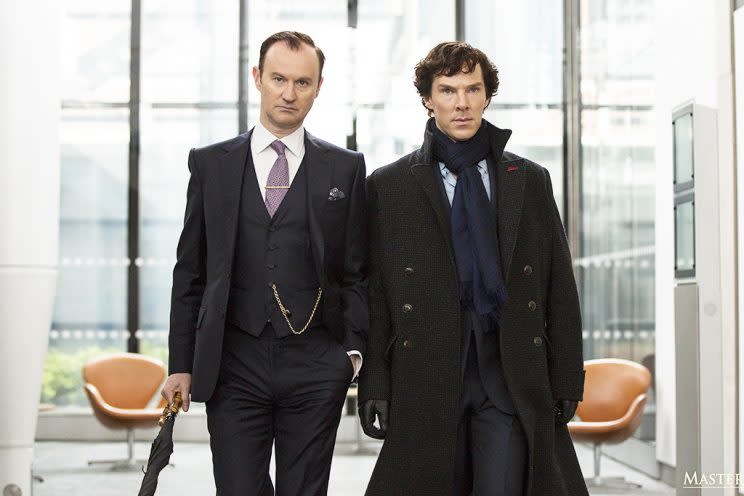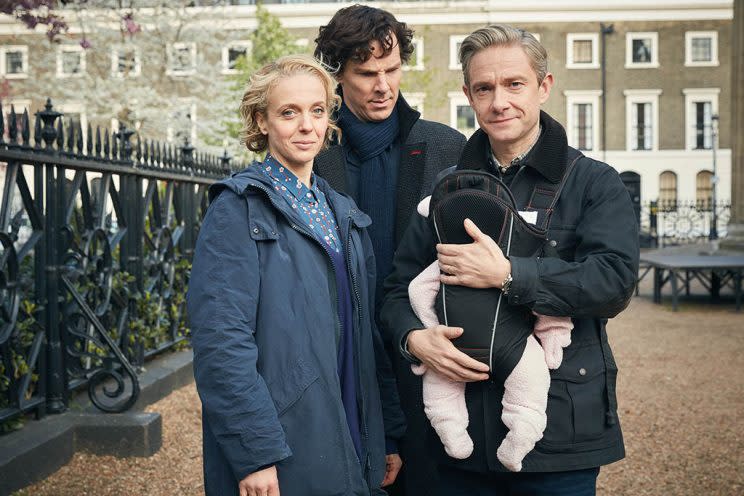‘Sherlock’ Co-Creator Mark Gatiss Previews Season 4: ‘The Show Is Back and We Think It’s Very Good’

Good news, Sherlock fans: The game’s afoot again at last. Three years after the hit BBC serial’s third season — and a year removed from the one-off special “The Abominable Bride” — the dynamic duo of Benedict Cumberbatch and Martin Freeman are back on the case as Sherlock Holmes and John Watson. A new season of three feature-length episodes commences Jan. 1 on Masterpiece on PBS, and co-creator Mark Gatiss (who also plays Holmes’s older brother, Mycroft) can’t wait for fans to start piecing together the clues following the revelation that Moriarty is dead for real … we think. Yahoo TV spoke with Gatiss about mind palaces, new babies, and roosting chickens.
Yahoo TV: You whet our appetites for Sherlock’s return with last year’s special, “The Abominable Bride.” Is there a time jump between that episode and the new season?
Mark Gatiss: No, it picks up right afterwards, and then there’s a little bit of a jump. It’s traditional for us to have to pick up in excruciating detail from something we shot 12 months or two years before! [Laughs] We had to do that with Sherlock’s fall from St. Bartholomew’s Hospital in Season 2, for example. We can’t help ourselves.
Each episode is loosely based on a Sir Arthur Conan Doyle story. How do you and Steven Moffat choose which stories to adapt?
Steve and I just sort of sit and kick around ideas, which is the most fun part of the process in a way. We both know which are our favorites, so there are no surprises in this season, because we knew we’d get around to these particular stories eventually. I’ve always wanted to do “The Red-Headed League,” and I did think at one stage that the season premiere, “The Six Thatchers,” would be based on it, but it didn’t fit the story I wanted to tell. So “The Adventures of the Six Napoleons” is the basis instead. The thing is, from the beginning of the series, we’ve made up new stories that go in totally different directions. The Season 2 episode “The Hounds of Baskerville” [based on Doyle’s 1902 novel, The Hound of the Baskervilles] is probably the [most faithful], because it’s one of the most famous stories, and is a full novel so there’s a lot of incident. Otherwise, the stories tend to be jumping-off points, because if you just adapted them, they’d only last about 20 minutes.
Sherlock’s trip to his mind palace in “The Abominable Bride” appeared to confirm that Moriarty is gone for good.
People just assume that we’re fibbing every time we say he’s definitely dead. [Laughs] We did come up with the line, “Of course he’s dead, he’s definitely dead. More importantly, I know exactly what he’s going to do next,” with appalling glee. This year, it’s all about shadows from the past coming back to haunt them, and the consequences of their actions. I would say the chickens are coming home to roost … without real chickens. There are no chickens in this season. That’s an exclusive!
Speaking of mind palaces, are you proud of having popularized that concept in pop culture?
I first came across that idea in Thomas Harris’s Hannibal Lecter books, and the British illusionist Derren Brown talks about it a lot as well. But it is one of those things you can just kind of say now without people going, “What do you mean?” It started as a way for Sherlock to remember something without him just going, “Oh, I remembered it!” Now it’s become this huge thing, which is really exciting. The whole premise of “The Abominable Bride” was that it takes place inside this amazing thing he’s constructed in his head.

Press photos have already revealed that there’s a new addition to Sherlock’s extended family this season: the Watsons’ new baby girl.
Yes, the Watsons have a baby. We wanted to enjoy that development without the whole show suddenly becoming a kind of rom-com. But there’s obviously a lot of fun to be had with the introduction of a random element. The baby is a mystery to him, and he’ll be slightly befuddled when things don’t go according to logic, because babies don’t do logic! So he treats her as a sort of problem to be solved rather than an emotional issue. It’s a bit like the best-man speech from last season. He treats it like a case, like it’s “The Puzzle of the Child.”
Sherlock is primarily Sherlock’s story, but I appreciate how the series can also be watched as the tale of John Watson’s journey from war veteran to family man.
Absolutely. We said very early on that what happens to John is that he falls down the rabbit hole. He comes back from Afghanistan sort of ruined, but he also wants a bit of peace. Then he discovers he’s living in this world he didn’t know about, and when you’re in the company of this extraordinary man, everything changes. He’s sort of an adrenaline junkie who claims he wants a quiet life, but actually as soon as the call to action comes, he’s there. And marrying a woman who seems just as ordinary, and then turns out to be anything but, is the right decision. Who else would a man like that marry? We were very keen not to have Mary Watson become a drag. Certain adaptations before have done that, and you start to resent a character like that because you want your heroes to be having fun. You don’t want someone to come and say, “No, sorry, you can’t come out and play.” That was a big part of the decision to cast Amanda [Abbington] and have them enjoy each other’s company. She’s very much part of the team.
What can you tease about Mycroft’s role this season?
For “The Abominable Bride,” I enjoyed teasing, “There’s a lot more of me,” because I was wearing a fat suit! [Laughs] This season, there’s quite a lot of me without the fat suit, but you’ll have to wait and see. All I’ll say is that past events have consequences for everybody in the series, not just Sherlock and John.
One of the more controversial elements of Season 3 was Sherlock’s decision to kill Charles Augustus Magnussen, the newspaper magnate and prolific blackmailer. Is that addressed this year?
We do address it, but it’s a tough one. We made the decision that, for the third season, we were going to show Sherlock apparently sort of softening, which is why the first two episodes of Season 3 are much more lighthearted. But Sherlock, in his original conception, is his own judge, jury, and executioner. He either lets people go that he probably shouldn’t because he’s compassionate, or he does something really quite strong and scary because he’s not the police. The character of Magnussen appalls him, and in the end, he just can’t see any other way out. It was a big decision to make, and we haven’t ignored it, but at the same time, you can’t spend three episodes talking about something that happened three years ago. We need to get on with the story, really.
Benedict Cumberbatch and Martin Freeman are busy actors but seem willing to make time for more Sherlock whenever possible. What keeps them coming back to the series and what excited them about this season in particular?
They’re both in top form this season, and had a real glee in coming back. We have to make the episodes on a very tight schedule, but everybody always responds to that really brilliantly. In terms of their characters, Ben and Martin are always very interested in where we are going to go and what there is left to do. If this were just a story-of-the-week series, where there’s a crime, Sherlock does some clever deductions to solve it, and they’re back by the fireside by teatime, that would be a very different series than the one we’ve done. They’re always interrogating us, asking, “What’s next for me?” “Why am I like this?” and “Why does Dr. Watson still spend time with this man?” Which, you know, is a legitimate question! [Laughs]
Steven Moffat is stepping away from his other series, Doctor Who, after this upcoming season. Do you both see an end point for Sherlock as well?
Honestly, and I’m not being disingenuous, we have absolutely no idea. There’s obviously a huge demand to carry on, and we’d love to carry on. It really depends on everybody’s availability. Benedict and Martin know what the series has done for them, and they’re very proud of it. They don’t need to [keep coming back], but they do love doing it. It’s really just a question of trying to organize diaries, and also [write] the stories we want to tell. It was genuinely very, very tough to schedule this season. But I would say to fans of all persuasions and levels of enthusiasm that the show is back and we think it’s very good.
Sherlock Season 4 premieres Jan. 1 at 9 p.m. on Masterpiece on PBS.

